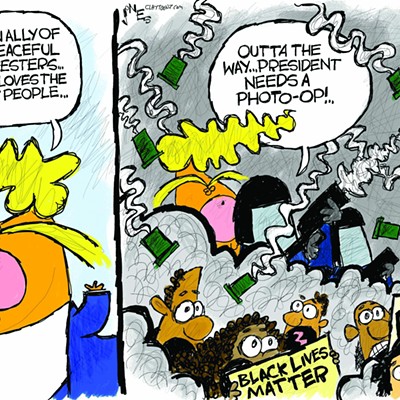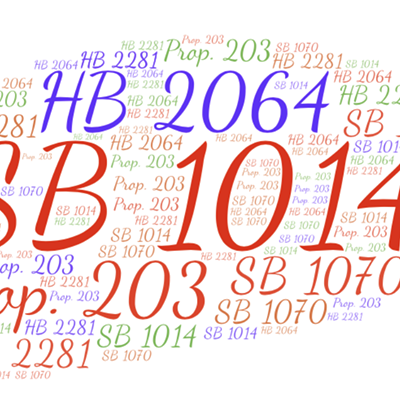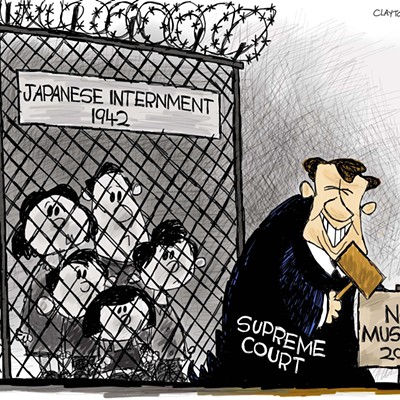When more than 300 UA students and faculty showed up to protest SB 1070 in the middle of campus on Wednesday, May 5, organizers hoped it would result in a statement from UA President Robert Shelton and the UA Police Department condemning the new law.
Several hours later, organizers went up to Shelton's office, where they presented him with 1,900 signatures from students, staff and faculty. They asked Shelton to add his signature to their petition, which asks the UA and UAPD to stand up against the new legislation.
MFA creative writing student Daniela Ugaz, one of the organizers who met with Shelton, said the UA president was welcoming, but he reportedly told the students that "2,000 signatures are impressive, but 20,000 would be really impressive."
Ugaz said students were hoping for more, considering that Arizona State University President Michael Crow came out against the bill the day it was signed.
"In my own view, the law as written will ... make Arizona seemingly and actually unfriendly to legal residents, potential residents and international visitors," Crow wrote to Brewer.
In contrast, Ugaz and other opposition organizers said that the UA administration and UAPD have been very cautious regarding SB 1070.
"So far, everyone I've talked to with (UAPD) has been very careful with their words, not giving a stance on how UAPD officially views the law—and even how any of them personally stood," Ugaz said.
The Tucson Weekly asked Sgt. Juan Alvarez, UAPD's public information officer, how the campus police department would deal with the law.
"At this point, the law has not taken affect yet, so we're reserving comment," Alvarez said. The law is set to take effect on July 29.
Alvarez said it's premature to comment, because there is still a chance SB 1070 will be ruled unconstitutional. Until SB 1070's fate is decided, he said, the UAPD's policy will remain the same.
"Only occasionally do we have incidences were we come across people in the country in violation of the law. Usually, it's in the process of an investigation for a specific criminal charge. During that time, we contact Border Patrol. If Border Patrol responds in a reasonable amount of time, they take them, but if not, we take them to jail," Alvarez said.
John Washington, a creative-writing graduate student and a campus-opposition organizer, said that after Brewer signed the bill, students needed reassurance, not caution. Washington said that several students in his creative-writing class told him that for the first time since starting college at the UA, they were scared.
"What we needed at that time was a statement from the administration and from campus police that the law was wrong, and they would protect students," Washington said.
On Thursday, April 29—six days after Brewer signed SB 1070 into law—Shelton sent an e-mail to faculty and staff acknowledging that SB 1070 has "raised worries about racial profiling," especially from the international-student community.
"I cannot state more firmly that the health and safety of our international students, faculty and professional staff are priorities of the highest order for us, and we are going to do everything possible to help each of them understand the law and its impact. We intend to put in place whatever procedures are necessary to ensure their safety and free movement on campus and in our community," Shelton wrote.
Regarding the UAPD, Shelton wrote that campus police will be "receiving extensive training on the specifications of the new law. I have total confidence that they will abide by the letter of the law, which includes a provision that individuals may not be stopped solely on the basis of race, color or national origin."
In the same message, Shelton said the university had already started to experience repercussions, with families of some out-of-state honors students sending their children to universities in other states next fall.
"This should sadden anyone who cares about attracting the best and brightest students to Arizona," Shelton wrote. "While I am completely confident that no one need fear the way that UAPD will approach the application of this law, I nevertheless appreciate the anxiety that friends and colleagues are feeling. It is a concern and fear that no one should have to harbor."
Shelton did not respond to an e-mail from the Weekly.
Washington said it was unwise for Shelton to wait almost a week before sending that e-mail to faculty and staff; he also doesn't think the message was strong enough. The silence was what made him and his friend Francisco Baires begin organizing campus opposition.
"Obviously, this law already has some effect—there have been repercussions—but we really need to make it clear that the UA and all the universities don't stand for this," said Baires, an anthropology graduate student.
One other repercussion: Officials at two universities in Mexico decided to suspend a student-exchange program at the UA in reaction to SB 1070. Baires said he wonders whether that could have been prevented had the administration and UAPD issued stronger, more immediate statements.
Now, the SB 1070 opposition is working to collect those 20,000 signatures that Shelton felt would be more impressive—from all three state universities—with a goal to presenting them to the Arizona Board of Regents.
Berkley Carnine, an ASU creative-writing graduate student and member of ASU's opposition group, said groups at all three state universities are working together, and want the three state universities to become sanctuary campuses if the law moves forward. An online petition should be posted this week to collect signatures from students and faculty in Flagstaff, Tempe and Tucson.
"Right now, we're working on defining it, but basically, 'sanctuary' means SB 1070 can't be legally enforced. The administrations would have to put out a memorandum to inform city officials and campus police that they would not be able to enforce this law on campus," Carnine said.
Carnine added that the sanctuary idea goes to the heart of Arizona Board of Regents policies that say campuses must work to increase enrollment on campus from minority communities and women, and to build trust.
"Not mitigating the harms of 1070 on campus violates those policies," she said.














